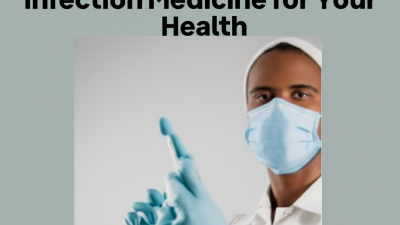The Ultimate Checklist for Choosing the Best Viral Infection Medicine for Your Health
In the rapidly evolving landscape of healthcare, the selection of the right Viral Infection Medicine is crucial for effective patient treatment and management. According to a recent report by the World Health Organization, viral infections account for nearly 50% of all infectious diseases globally, underscoring the necessity for timely and appropriate therapeutic interventions. The global market for antiviral drugs is projected to reach $63.5 billion by 2025, driven by increasing incidences of viral infections and the demand for newer, more effective treatments. This checklist aims to guide you through the essential factors to consider when choosing viral infection medications, ensuring that your health and well-being are prioritized in an era where timely and effective treatment is paramount.

Evaluating the Effectiveness of Viral Infection Medicines Available Today
When evaluating the effectiveness of viral infection medicines available today, it’s crucial to consider both recent advancements and established treatment options. For example,
Baloxavir Marboxil, a novel oral antiviral, shows promise in treating uncomplicated influenza A, as evidenced by recent observational studies that underline its real-world effectiveness and safety.
This adds a new layer to our understanding of antiviral options, indicating that newer therapies may provide substantial benefits for patients when traditional treatments like Oseltamivir are less effective.
Additionally, ongoing research into therapeutic strategies for respiratory viruses, including the development of inhaled antibiotics for bronchiectasis and investigational drugs for severe RSV in young children, emphasizes the importance of diversified treatment approaches.
These studies not only highlight the safety and efficacy of various agents but also point toward a future where more targeted and effective antiviral treatments become available.
Assessing these medicines against established clinical guidelines can further help healthcare providers make informed decisions tailored to patient needs.
Understanding Different Types of Viral Infections and Their Treatments
Viral infections pose a significant challenge to public health, with data from the World Health Organization indicating that they account for 90% of all infectious diseases globally. Understanding the various types of viral infections—such as influenza, HIV, and hepatitis—along with their corresponding treatments is pivotal for effective management. For instance, the CDC highlights that influenza causes 9 million to 45 million illnesses annually in the U.S. alone, prompting the need for antiviral medications like oseltamivir to reduce symptom severity and duration.
When considering treatment options, it's crucial to discern between prophylactic measures and therapeutic interventions. The Global Burden of Disease Study reports that viruses like hepatitis B and C lead to over 1.3 million deaths per year, emphasizing the importance of antiviral therapies such as tenofovir and direct-acting antivirals. Additionally, understanding the development of emerging treatments, including monoclonal antibodies for COVID-19, underscores the continuous evolution of antiviral strategies aimed at mitigating the impact of viral infections on health systems worldwide.
Assessing the Quality Standards of Chinese-Manufactured Medicines
When selecting viral infection medicine, it's essential to consider the quality standards of Chinese-manufactured medicines. Recent studies indicate that nearly 40% of pharmaceutical products imported from China are subject to quality scrutiny, highlighting the importance of regulatory compliance in manufacturing practices. The China Food and Drug Administration (CFDA) sets rigorous guidelines, ensuring that manufacturers adhere to Good Manufacturing Practices (GMP). This is crucial for ensuring the efficacy and safety of medications, especially in a global market where counterfeit products can pose significant health risks.
Tip: Always check for certifications like GMP and ISO when purchasing medicines. These certifications indicate that the manufacturer follows strict quality control processes, thus safeguarding your health.
Additionally, understanding the active ingredients in these medicines is crucial. A report from the World Health Organization (WHO) suggests that effective antiviral agents should meet specific criteria, including potency and bioavailability. Chinese manufacturers are increasingly focusing on research and development to enhance the effectiveness of their products, with investments in this area growing by over 20% in the past few years.
Tip: Research the active ingredients and their proven effectiveness against viral infections to make informed decisions about the medicines you choose. Always consult healthcare professionals when in doubt about which medication is right for you.
Key Factors to Consider When Choosing Viral Infection Medicines for Health
When selecting the most appropriate viral infection medicine, several key factors must be taken into consideration to ensure optimal health outcomes. Firstly, it's essential to evaluate the specific type of viral infection being targeted. According to the World Health Organization, different viruses require tailored antiviral therapies, as the effectiveness of a medication can significantly vary based on the virus strain. For instance, the treatments for influenza differ vastly from those for herpes viruses, underscoring the need for precise diagnosis prior to treatment.
Moreover, potential side effects and drug interactions play a crucial role in the decision-making process. A study published in the Journal of Antimicrobial Chemotherapy highlighted that nearly 30% of patients experience adverse reactions to antiviral medications, which can impact adherence to treatment. It’s vital to consider a patient's overall health status, existing medical conditions, and current medications to minimize risks. Therefore, engaging in an informed discussion with healthcare professionals can help in weighing the benefits against potential risks, leading to a more tailored treatment approach. Such careful consideration not only enhances treatment efficacy but also safeguards patient health.
The Importance of Consulting Healthcare Professionals Before Medication Selection
When it comes to selecting the best viral infection medicine, consulting healthcare professionals is of utmost importance. They possess the knowledge and experience to guide you through the myriad of options available, ensuring that your choice aligns with your specific health needs. Healthcare providers can assess your medical history, current conditions, and any medications you're already taking, reducing the risk of adverse interactions and side effects.
**Tips:** Always ensure to communicate openly with your healthcare provider about any symptoms you're experiencing and any medications you've previously taken. This will allow them to make informed recommendations tailored to your situation. Additionally, don't hesitate to ask questions about the potential effectiveness and side effects of the suggested medications, as understanding these factors can empower you in the decision-making process.
Another crucial aspect is to stay informed about the latest research regarding viral infection treatments. Healthcare professionals often have access to updated information and guidelines that can influence treatment options.
**Tips:** Keep a list of reliable health resources to consult for current information on medication options. This can empower you to engage in meaningful discussions with your healthcare provider about the best choices for your health.
The Ultimate Checklist for Choosing the Best Viral Infection Medicine
This chart illustrates the effectiveness of various antiviral medications based on recent studies. The effectiveness is measured by the percentage of patients who showed improvement within a week of treatment.
